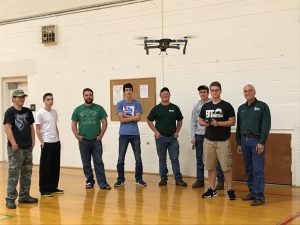Wind Power Students Take to the Skies
Wind Power Technology students at Northern Maine Community College now have another high-flying tool in their educational tool kit.
NMCC Wind Power Technology Instructor Wayne Kilcollins recently became Unmanned Aircraft Systems (UAS) Drone certified to fly drones for business and work. Kilcollins’ new certification will allow him to incorporate his knowledge in the classroom. He will now be able to demonstrate how to inspect wind turbine blades and nacelles using a drone, which is becoming an industry standard.

With the supervision of their instructor, Wayne Kilcollins, far right, Wind Power Technology students practice drone flight in the Northern Maine Community College gymnasium.
The College purchased a drone for Kilcollins to incorporate into the Wind Power Technology curriculum.
“We always aim to provide our students with the latest industry practices to keep them highly competitive in the workforce,” said Kilcollins. “We frequently communicate with our industry partners to realize their needs. When we have an opportunity to anticipate their expectations, it definitely works in our favor.”
Kilcollins added, “As much fun as it seems to be to fly the drones, there are certain parameters and considerations I share with the students.”
There are numerous regulations associated with drone flight, especially near an active airport.
“In order to legally fly over the College, We needed to request a part 107b wavier from the Federal Aviation Administration (FAA). The FAA wavier along with an agreement with the Northern Maine Regional Airport allowed the manufacturer of our drone to open the airspace over the college for us to fly,” he explained. “Otherwise our proximity to the Presque Isle airport restricts our abilities to enable drone flight training.”
Drones used for commercial activities come with Global Positioning Satellite (GPS) functionality which can be monitored by the FAA. Restricted No Fly Zones (NFZ), such as airports, are geofenced, which automatically locks the drone from flying.
The Wind Power Technology program at NMCC is designed to prepare technicians wishing to enter this growing industry. The program offers broad fundamental training in the electrical, electronic, and mechanical aspects of the wind power industry, with a focus on wind turbine maintenance and electrical power production.
The National Electrical Code Standards are introduced and reinforced throughout the program so the students are aware of existing electrical standards that are required during their career activities as wind technicians.
Graduates of the program have found employment opportunities with wind farm operators, turbine manufacturers, and contractors providing maintenance and turbine support both locally and global.
The college launched the Wind Power Technology program, the first of its kind in New England, in 2008.




